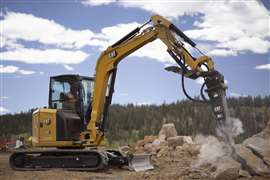Market Strengths
20 March 2008

When Dominique Pagniez, Comabi's sales and marketing director, looks at the French market – which is 92% of the company's sales – he sees 100000 customers and 3000 distributors.
Sixty percent of sales pass through distributors, the vast majority of whom represent Comabi exclusively. The other sales are administered from Comabi's Trévoux headquarters, near Lyon, where the company prepares bids for façade–scaffolding systems on big or complex projects.
These thousands of distributors make it possible for Comabi to effectivly reach its French customers – the country has 36000 towns and cities – but they also make it more difficult for foreign competitors to enter the market. “It costs a lot to develop distribution in France”, says Mr Pagniez, who has spent 20 years with Comabi, “Marketing and distribution are very expensive. Even the Chinese would find it difficult.”
Further explaining the importance of distributors, Mr Pagniez said, “Seventy to 80% of scaffolding in the French market is sold as components. It is not difficult for distributors to sell components.”
It is new ownership, and the resulting greater focus on product development, however, that Mr Pagniez identifies as a critical factor in the company's recent growth. Since Comabi was sold by SGB seven years ago to Zarges–Tubesca, it has doubled its turnover, reaching €40 million last year. The Zarges acquisition, says Mr Pagniez, “gave Comabi a new outlook. Comabi was not a priority for SGB.”
The increased focus apparently increased product innovation: “Each year we spend 10% of turnover on new products. This is the main reason for our success,” he says.
Getting those new products to market begins with the company's seven designers, who are among the 150 full–time employees based at Comabi's 12000 m2 factory and 1100 m2 office at Trévoux.
No rental competition
Comabi also has a firm policy on not competing directly with its rental companies, who take 30% of Comabi's sales. “We are unique in Europe because we don't compete with rental companies. It is the main benefit we offer. We tell them, “We are not your competitor. We want to help you win big products with our products.”
“We will never, never become a competitor to our rental company customers. We'll never compete with end users”, he says.
However, France's size and Comabi's well–established distribution are not the only factors favouring the company. “I think regulations are important in France. Regulations have changed the market. Under French regulations, you are obligated to erect in a safe position. If you don't, it can stop the building site.”
2004, specifies one deck for each 3 m of height of scaffolding, while European regulations allow one deck for each 4 m. French law also requires a worker erecting any type of access structure to be in a ‘safe position’ throughout the entire process.
Comabi has complied, of course, and Mr Pagniez feels the regulations have prompted Comabi to be innovative and to respond quickly. He says, to give an example, that recent improvements to its Generis access tower range have helped it maintain leadership in a market of 50000 units per year in France.
Does compliance with national directives have benefit outside France? “Today Comabi is in a unique position. In France and in Europe, nobody else can erect mobile towers in a safe position”, he claims, “It is a big benefit. End users are looking for the easiest way to erect, which is also the fastest.”
For all its strength in France, the company will face challenges. Earlier this year, for example, Mr Pagniez saw Chinese manufacturers bid on complete systems for major projects in France. In the past they offered only scaffold components.
Mr Pagniez does not appear to be panicking; “One or two tenders will not allow China to penetrate the French market.” He at least appears to be speaking from a position of strength.SI



